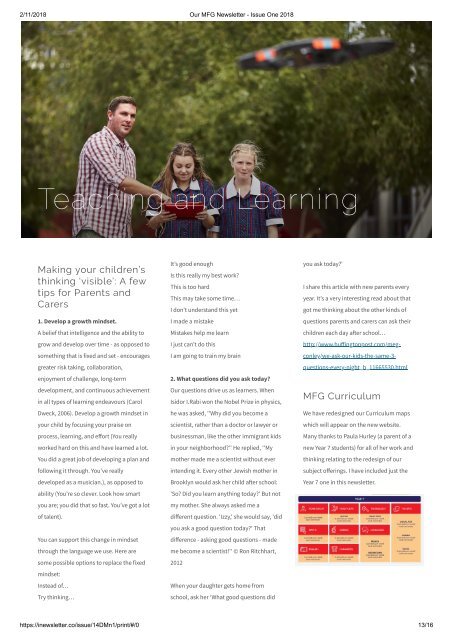Our MFG Newsletter - Issue One 2018
Create successful ePaper yourself
Turn your PDF publications into a flip-book with our unique Google optimized e-Paper software.
2/11/<strong>2018</strong> <strong>Our</strong> <strong>MFG</strong> <strong>Newsletter</strong> - <strong>Issue</strong> <strong>One</strong> <strong>2018</strong><br />
Teaching and Learning<br />
Making your children’s<br />
thinking ‘visible’: A few<br />
tips for Parents and<br />
Carers<br />
1. Develop a growth mindset.<br />
A belief that intelligence and the ability to<br />
grow and develop over time - as opposed to<br />
something that is fixed and set - encourages<br />
greater risk taking, collaboration,<br />
enjoyment of challenge, long-term<br />
development, and continuous achievement<br />
in all types of learning endeavours (Carol<br />
Dweck, 2006). Develop a growth mindset in<br />
your child by focusing your praise on<br />
process, learning, and e ort (You really<br />
worked hard on this and have learned a lot.<br />
You did a great job of developing a plan and<br />
following it through. You’ve really<br />
developed as a musician.), as opposed to<br />
ability (You’re so clever. Look how smart<br />
you are; you did that so fast. You’ve got a lot<br />
of talent).<br />
You can support this change in mindset<br />
through the language we use. Here are<br />
some possible options to replace the fixed<br />
mindset:<br />
Instead of…<br />
Try thinking…<br />
It’s good enough<br />
Is this really my best work?<br />
This is too hard<br />
This may take some time…<br />
I don’t understand this yet<br />
I made a mistake<br />
Mistakes help me learn<br />
I just can’t do this<br />
I am going to train my brain<br />
2. What questions did you ask today?<br />
<strong>Our</strong> questions drive us as learners. When<br />
Isidor I.Rabi won the Nobel Prize in physics,<br />
he was asked, ''Why did you become a<br />
scientist, rather than a doctor or lawyer or<br />
businessman, like the other immigrant kids<br />
in your neighborhood?'' He replied, ''My<br />
mother made me a scientist without ever<br />
intending it. Every other Jewish mother in<br />
Brooklyn would ask her child a er school:<br />
'So? Did you learn anything today?' But not<br />
my mother. She always asked me a<br />
di erent question. 'Izzy,' she would say, 'did<br />
you ask a good question today?' That<br />
di erence - asking good questions - made<br />
me become a scientist!'' © Ron Ritchhart,<br />
2012<br />
When your daughter gets home from<br />
school, ask her ‘What good questions did<br />
you ask today?’<br />
I share this article with new parents every<br />
year. It’s a very interesting read about that<br />
got me thinking about the other kinds of<br />
questions parents and carers can ask their<br />
children each day a er school…<br />
http://www.hu ingtonpost.com/meg-<br />
conley/we-ask-our-kids-the-same-3-<br />
questions-every-night_b_11665530.html<br />
<strong>MFG</strong> Curriculum<br />
We have redesigned our Curriculum maps<br />
which will appear on the new website.<br />
Many thanks to Paula Hurley (a parent of a<br />
new Year 7 students) for all of her work and<br />
thinking relating to the redesign of our<br />
subject o erings. I have included just the<br />
Year 7 one in this newsletter.<br />
https://inewsletter.co/issue/14DMn1/print/#/0 13/16


